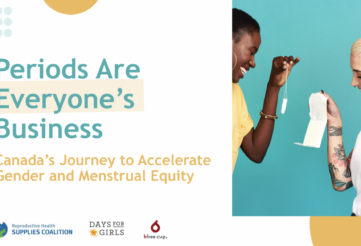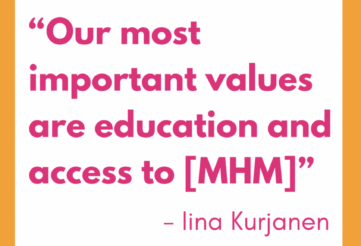How to Talk About Periods Without Stigma

Promoting menstrual equity is no easy task.
Nearly one-fourth of the world’s women and girls, in both low and high resource countries, face challenges related to menstrual health management, and many disparities have intensified during the pandemic. We want to have a world where women and girls can manage their periods — and therefore, their health — with dignity and comfort. One of the ways we can accomplish this is by eradicating period stigma.
Period stigma (or menstruation stigma) is a broad term used to describe discrimination faced by people who menstruate. This stigma can manifest as a lack of access to sanitation supplies or verbal shaming of menstruating people as “unclean”, which can lead to lower quality of life and even harm, especially in developing nations. Here are three ways we can talk about periods without any stigma:
Discuss periods without shame
Menstruation is normal and natural, occurring monthly for 40 years for everyone who has a womb. It isn’t shameful at all, but the way we talk about menstruation makes it seem like it is. We used hushed tones and code words like “Aunt Flo”, “Code Red”, or “That Time of The Month” rather than speaking about it in a straightforward way. In most places, it’s also considered embarrassing when a female suddenly gets their period and unknowingly bleeds through their pants in public.
This perpetuates the idea that menstruation isn’t an acceptable topic to discuss plainly, making period taboo hard to overcome. By talking about menstruation at home, in social circles, in advertising campaigns, and in everyday life, women and girls won’t feel ashamed to get the care they need.
Provide adequate menstrual education in schools
Many young girls face confusion and misconceptions about periods once they hit puberty. Moreover, they may not have a female adult around them knowledgeable enough to talk about menstruation with. In other cases, young girls may feel uncomfortable talking about it. That is why it’s crucial to provide timely, accurate, and age-appropriate menstrual health education in schools. Discussing periods in K-12 classrooms — for both boys and girls — can help shatter period stigma and taboo at an early age. As periods are a medical concern, it may be more comfortable for students to hear about menstrual health from health visitors, nurses, midwives, and expert organizations such as Days for Girls.
Beyond supporting female students who have menstrual pain, for instance, school nurses play a pivotal role in providing health education — including topics related to puberty and sexual health — more than other teachers. In fact, some studies even suggest students want improved education on menstrual pain, and these experts are in an ideal position to make every contact count. Inviting nursing health practitioners who specialize in pediatrics and family medicine ensures adequate education on puberty and menstrual hygiene, because these nurses are trained in children’s health from birth to young adulthood. Aside from school-mandated healthcare programs, pediatric check-ups should aim to incorporate messages that eliminate period stigma as well.
Promote menstrual health as part of self-care
We may not realize it, but there is a strong connection between self-care and menstrual health. Girls and women who undergo their menstrual phase each month have to manage their blood flow, pain, and discomfort. During other phases of the cycle, they also need to address changes in their hormone levels, which may affect their metabolism, appetite, or mood. Including menstrual health and hygiene in our conversations about self-care can greatly lead to improved outcomes, especially in relation to menstrual conditions like polycystic ovarian syndrome, dysmenorrhea, and endometriosis.
By eliminating stigma, we empower women to practice menstrual health openly — with no shame, embarrassment, or negative repercussions. Aside from visible, positive effects like less missed work or school days, reducing menstrual stigma can also lead to positive emotional impact. Girls and women would be less stressed and have better self-esteem, leading to a happier and healthier population.
This post was written by guest blogger Reese Jones









